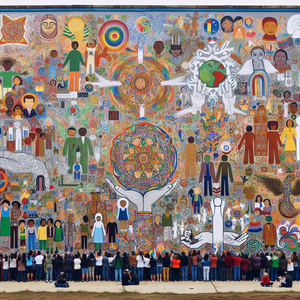The Science of Tradition: Why Rituals Matter for Mental Well-being

Traditions can be defined as established patterns of behavior passed down through generations, rich with meaning and significance. These may include holiday gatherings, weekly family dinners, or special birthday celebrations. According to Dr. Barbara Fiese, a clinical psychologist and researcher at the University of Connecticut, family traditions serve as a compass, guiding individuals through life’s transitions and challenges. They create a sense of continuity, belonging, and identity, which is essential for mental well-being.
Enhancing Emotional Stability
One of the most significant psychological benefits of family traditions is their role in fostering emotional stability. Engaging in regular rituals provides a predictable structure that can help alleviate anxiety and stress. For example, when a family gathers every Sunday for dinner, they not only enjoy a meal together but also build anticipation for this essential time to connect. This consistency creates a refuge, offering comfort and a sense of safety. Research supports the idea that families who maintain traditions report higher levels of emotional well-being. A study published in the Journal of Family Psychology found that children who participate in family rituals demonstrate better emotional regulation and resilience. They are more adept at handling stress and are less likely to engage in risky behaviors. The predictability of rituals fosters a secure environment, allowing family members to express themselves freely and openly.
Fostering Connections and Creating Memories
Family traditions also play a crucial role in strengthening interpersonal connections. These rituals provide opportunities for family members to bond, share stories, and create lasting memories. Whether it’s an annual camping trip or Friday movie nights, these shared experiences become integral to the family narrative. For instance, a family might have a tradition of creating a scrapbook each year to document their adventures. This practice serves not only as a creative outlet but also reinforces family ties by encouraging storytelling and reflection. When members revisit these scrapbooks, they relive joyful moments, reinforcing their shared identity and emotional connection.
The Role of Traditions in Navigating Change
Family traditions can be particularly valuable during times of change or uncertainty. Life events such as moving to a new city, dealing with loss, or facing health challenges can disrupt the family dynamic. In such instances, maintaining rituals provides a sense of normalcy and stability. For example, a family that has lost a loved one may choose to honor their memory through an annual remembrance dinner. By gathering to share stories and celebrate the deceased's life, the family not only grieves together but also strengthens their bonds, ensuring that the memory of their loved one lives on within the family fabric. This shared act of remembrance can be a powerful source of comfort.
As we navigate a world filled with rapid changes and increasing demands on our time, the importance of family traditions cannot be overstated. They enhance emotional stability, foster connections, and help families navigate life’s challenges. By consciously incorporating traditions into our lives, we cultivate an environment that promotes mental well-being and strengthens familial bonds. In essence, family rituals are more than mere activities; they are vital threads woven into the fabric of our lives that contribute to our overall happiness and cohesion. As we continue to embrace these traditions, particularly in a time when personal connections are more important than ever, we ensure that they remain a source of joy, security, and love for generations to come.
Family Therapist
Community health centers, private practices, mental health clinics
Core Responsibilities
Provide counseling to families to improve communication and resolve conflicts.
Develop therapeutic plans that incorporate family traditions and rituals as tools for healing.
Facilitate workshops or group sessions focused on enhancing familial relationships.
Required Skills
Master’s degree in Marriage and Family Therapy or related field.
Proficient in family systems theory and various therapeutic modalities.
Strong interpersonal skills for building trust and rapport with clients.
Community Engagement Coordinator
Non-profit organizations, local government agencies, community centers
Core Responsibilities
Design and implement programs that promote community bonding through cultural and family-oriented events.
Collaborate with local organizations to plan family-oriented activities, such as festivals and workshops.
Assess community needs and develop initiatives that foster social connections and traditions.
Required Skills
Bachelor’s degree in Social Work, Community Development, or related field.
Excellent organizational and communication skills.
Experience in event planning and community outreach.
Child Development Specialist
Educational institutions, family service agencies, childcare centers
Core Responsibilities
Assess and support children’s emotional and social development within the context of family traditions.
Work with families to implement practices that enhance children’s emotional regulation and resilience.
Conduct workshops for parents on the impact of family rituals on child development.
Required Skills
Bachelor’s or Master’s degree in Child Development, Psychology, or Education.
Knowledge of developmental psychology and child behavior.
Strong communication skills for interacting with children and parents.
Cultural Anthropologist
Universities, research institutions, cultural organizations
Core Responsibilities
Study and analyze family traditions and rituals across different cultures and their impact on mental well-being.
Conduct field research and interviews to document cultural practices related to family dynamics.
Present findings to academic institutions and contribute to publications on the significance of rituals.
Required Skills
Advanced degree in Anthropology, Sociology, or a related field.
Strong qualitative research and analytical skills.
Ability to communicate complex ideas effectively to diverse audiences.
Family Life Educator
Community colleges, family service organizations, non-profit educational programs
Core Responsibilities
Develop educational programs that teach families about the importance of traditions for mental health and well-being.
Facilitate workshops that encourage families to create and maintain their own rituals.
Provide resources and support for families navigating life’s transitions, emphasizing the role of traditions.
Required Skills
Degree in Family Studies, Education, or a related field.
Experience in curriculum development and teaching.
Strong presentation and facilitation skills.


